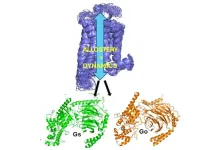(Press-News.org) Despite widespread support, laws enforcing universal background checks at the time of firearm purchase may not be enough to move the needle on reducing shooting deaths in the United States. A Tufts University School of Medicine study, published August 1 in the journal JAMA Network Open, reports that states that require gun permits rather than relying solely on universal background checks see firearm homicide rates, on average, 18% lower than states with background check policies alone.
The analysis compared firearm homicide data from the 12 states with universal background check laws but no permit requirements (e.g., New York, Nevada, Vermont) and the 7 states with gun permit laws (e.g., Massachusetts, California, Rhode Island) from 1976 to 2022. States in the former group showed slight variations in firearm homicide rates while those with permit laws saw reductions in shooting deaths ranging from 2% to 32%.
“These findings cast doubt on the main strategy currently being used by gun violence prevention advocates and policymakers to reduce firearm fatalities,” says study author Michael Siegel, a professor of public health and community medicine at the School of Medicine. “If state lawmakers really want to reduce gun violence, the most effective policy they can enact is one that requires permits in order to purchase or possess a gun.”
While research on universal background check laws shows that they are associated with decreases in firearm homicides, most of this work has not differentiated between policies requiring permits and those that do not. By separating them, two studies from 2018 and 2020 found early evidence that the success of universal background checks can be attributed to the permit laws. These findings are further supported by Siegel’s investigation, which compared firearm death rates recorded by the Centers for Disease Control and Prevention to the State Firearm Law Database, a database he oversees at Tufts that aggregates and updates all state firearm legislation.
Siegel is not surprised that gun permits are associated with lower firearm fatalities. While requirements vary by state, permit laws typically require someone who wants to own a gun to go through a series of checks before granting authorization, valid for several years, to purchase firearms from various dealers. The advantage of state permits is that their criminal databases are more consistently kept up to date and are more likely to record lower-level crimes, such as domestic battery or a DUI, compared to the federal databases used for universal background checks, which rely on states to track this data.
Universal background checks can fail when a request for a background check takes so long to come back that it has passed the window of time—72 hours—that a person can legally be kept waiting for a gun. This loophole allows individuals with criminal records to make a firearm purchase by default. Background checks are also less effective when someone has recently committed a crime that disqualifies them from owning a gun, while permits can be immediately suspended.
“Some gun owners might hear this and say that permits are much more intrusive, but I want to emphasize it’s actually a win-win, both for gun owners and public health,” says Siegel. He argues that gun owners on average have four or more firearms, so having a permit system makes it easier for them to make multiple purchases over time because their permit wouldn’t require them to get a background check for each exchange.
Siegel plans to continue exploring the emerging association between gun permit laws and firearm homicide rates, while also examining their impact on firearm suicides.
“One of the major implications of this research is that it supports changing the way we do things, such as encouraging all states to adopt reciprocal permitting systems, meaning a person with a gun permit in one state would be allowed to bring their license and gun legally into another state,” says Siegel.
END
Gun permits may be more effective than background checks alone at reducing firearm homicides
Tufts University School of Medicine analysis suggests universal background checks alone aren’t associated with significantly lower shooting death rates in the US
2024-08-01
ELSE PRESS RELEASES FROM THIS DATE:
Study finds regular aspirin use associated with greatest reduction in colorectal cancer among those most at risk
2024-08-01
Regular aspirin may help lower risk of colorectal cancer in people with greater lifestyle-related risk factors for the disease, according to a study led by researchers at Mass General Brigham. The study, published in JAMA Oncology, could encourage a more nuanced approach to preventive aspirin use.
“We sought to identify individuals who are more likely to benefit from aspirin to facilitate more personalized prevention strategies,” said co-senior author Andrew Chan, MD, MPH, Director of Epidemiology for the Mass General Cancer Center and gastroenterology Director of the Center for ...
Diagnostic accuracy of an integrated AI tool to estimate gestational age from blind ultrasound sweeps
2024-08-01
About The Study: Between 14 and 27 weeks’ gestation, novice users with no prior training in ultrasonography estimated gestational age as accurately with the low-cost, point-of-care artificial intelligence (AI) tool as credentialed sonographers performing standard biometry on high-specification machines. These findings have immediate implications for obstetrical care in low-resource settings, advancing the World Health Organization goal of ultrasonography estimation of gestational age for all pregnant people.
Quote from corresponding author Jeffrey ...
Aspirin use and incidence of colorectal cancer according to lifestyle risk
2024-08-01
About The Study: Aspirin use was associated with a greater absolute reduction in risk of colorectal cancer among individuals with less healthy lifestyles in this cohort study. The findings of the study suggest that lifestyle risk factors may be useful to identify individuals who may have a more favorable risk-benefit profile for cancer prevention with aspirin.
Corresponding Authors: To contact the corresponding authors, email Andrew T. Chan, MD, MPH (achan@mgh.harvard.edu) and Long H. Nguyen, MD, MS (lnguyen24@mgh.harvard.edu).
To access the embargoed study: Visit our For The Media website at this link https://media.jamanetwork.com/
(doi:10.1001/jamaoncol.2024.2503)
Editor’s ...
State abortion policy and moral distress among clinicians providing abortion after the Dobbs decision
2024-08-01
About The Study: In this purposive national survey study of clinicians providing abortion, moral distress was elevated among all clinicians and more than twice as high among those practicing in states that restrict abortion compared with those in states that protect abortion. The findings suggest that structural changes addressing bans on necessary health care, such as federal protections for abortion, are needed at institutional, state, and federal policy levels to combat widespread moral distress.
Corresponding Author: To contact the corresponding author, ...
Universal background checks, permit requirements, and firearm homicide rates
2024-08-01
About The Study: This cross-sectional study found that universal background checks alone were not associated with firearm homicide rates, but a permit requirement for the purchase and possession of firearms was associated with substantially reduced rates of firearm homicide. The findings suggest that combining universal background checks and permit-to-purchase requirements is an effective strategy for firearm-related fatality reduction.
Corresponding Author: To contact the corresponding author, Michael Siegel, MD, MPH, email mike.siegel@tufts.edu.
To access the embargoed study: Visit our For The Media website at this link https://media.jamanetwork.com/
(doi:10.1001/jamanetworkopen.2024.25025)
Editor’s ...
Joseph Rogers, MD, named to American Board of Internal Medicine’s Cardiovascular Board
2024-08-01
Houston, Texas, July 24, 2024 – The Texas Heart Institute, a globally renowned cardiovascular health center, announced today that Joseph G. Rogers, MD, President and Chief Executive Officer for The Texas Heart Institute and Adjunct Professor in the Division of Cardiology at Duke University, has been appointed by the American Board of Internal Medicine (ABIM) to its Cardiovascular Board for a three-year term beginning July 1, 2024.
“I am honored to have been appointed to this esteemed group ...
Study examines effect of fish oil in older adults’ brains
2024-08-01
A clinical trial at Oregon Health & Science University suggests that a subset of older adults with a genetic predisposition to Alzheimer’s disease may benefit from fish oil supplements.
The study published today in the journal JAMA Network Open.
The results come amid claims that fish oil supplements can improve brain function in people with memory problems. The study found no statistically significant benefit for all older adults in general. However, among those enrolled in the study who also carry a gene associated with Alzheimer’s disease, it showed a reduction in the breakdown of nerve cells in the brain.
The study’s senior co-author from OHSU ...
Conformational dynamics and allostery elucidate how GPCR couple to multiple G-proteins, offering mechanistic insights into coupling-promiscuity and novel drug discovery strategies
2024-08-01
In a groundbreaking study, a multinational research team led by Dr. Adnan Sljoka (RIKEN) and Prof. Akio Kitao (Tokyo Tech), in collaboration with Prof. Scott Prosser (University of Toronto), has carried out experimental and computational studies to elucidate the mechanisms behind G protein selectivity and efficacy in the human adenosine A2A receptor (A2AR). A2AR is a member of major drug targets G protein-coupled receptor (GPCR) superfamily, which engages the G protein and initiates cell signaling, influencing heart health, inflammation, cancer, and brain diseases. Scientists have ...
Proteins as the key to precision medicine: Finding unknown effects of existing drugs
2024-08-01
Fewer side effects, improved chances of healing: the goal of precision medicine is to provide patients with the most individualized treatment possible. This requires a precise understanding of what is happening at the cellular level. For the first time, researchers at the Technical University of Munich (TUM) have now succeeded in mapping the interactions of 144 active substances with around 8,000 proteins. The results could help to identify previously unknown potential benefits of existing drugs.
Practically all drugs either affect, produce or eliminate proteins – or are, in fact, proteins. But what exactly happens when a high or low dose is taken? And what is going ...
Cheese of the future: Consumers open to animal-free alternatives
2024-08-01
Companies and institutes are currently working on biotechnological processes for the production of dairy products without the use of cows: In so-called precision fermentation, egg and milk proteins are produced with the help of bacteria, yeasts or other fungi. This results in foods such as milk or cheese with a familiar flavour and texture. Supporters hope that this will lead to more sustainable food production, as nutrient-rich proteins can be produced using fewer resources. But will consumers accept such products? Researchers at the University of Göttingen have found that a large proportion of German consumers are willing to try and buy cheese produced in this way. ...
LAST 30 PRESS RELEASES:
Iron deficiency blocks the growth of young pancreatic cells
Selective forest thinning in the eastern Cascades supports both snowpack and wildfire resilience
A sea of light: HETDEX astronomers reveal hidden structures in the young universe
Some young gamers may be at higher risk of mental health problems, but family and school support can help
Reduce rust by dumping your wok twice, and other kitchen tips
High-fat diet accelerates breast cancer tumor growth and invasion
Leveraging AI models, neuroscientists parse canary songs to better understand human speech
Ultraprocessed food consumption and behavioral outcomes in Canadian children
The ISSCR honors Dr. Kyle M. Loh with the 2026 Early Career Impact Award for Transformative Advances in Stem Cell Biology
The ISSCR honors Alexander Meissner with the 2026 ISSCR Momentum Award for exceptional work in developmental and stem cell epigenetics
The ISSCR honors stem cell COREdinates and CorEUstem with the 2026 ISSCR Public Service Award
Minimally invasive procedure effectively treats small kidney cancers
SwRI earns CMMC Level 2 cybersecurity certification
Doctors and nurses believe their own substance use affects patients
Life forms can planet hop on asteroid debris – and survive
Sylvia Hurtado voted AERA President-Elect; key members elected to AERA Council
Mount Sinai and King Saud University Medical City forge a three-year collaboration to advance precision medicine in familial inflammatory bowel disease
AI biases can influence people’s perception of history
Prenatal opioid exposure and well-being through adolescence
Big and small dogs both impact indoor air quality, just differently
Wearing a weighted vest to strengthen bones? Make sure you’re moving
Microbe survives the pressures of impact-induced ejection from Mars
Asteroid samples offer new insights into conditions when the solar system formed
Fecal transplants from older mice significantly improve ovarian function and fertility in younger mice
Delight for diastereomer production: A novel strategy for organic chemistry
Permafrost is key to carbon storage. That makes northern wildfires even more dangerous
Hairdressers could be a secret weapon in tackling climate change, new research finds
Genetic risk for mental illness is far less disorder-specific than clinicians have assumed, massive Swedish study reveals
A therapeutic target that would curb the spread of coronaviruses has been identified
Modern twist on wildfire management methods found also to have a bonus feature that protects water supplies
[Press-News.org] Gun permits may be more effective than background checks alone at reducing firearm homicidesTufts University School of Medicine analysis suggests universal background checks alone aren’t associated with significantly lower shooting death rates in the US


